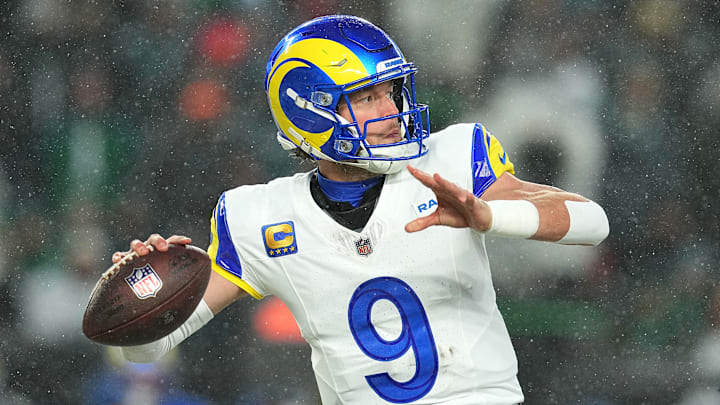There have been recent rumors swirling about the Los Angeles Rams potentially trading QB Matthew Stafford. While the validity of these reports remains uncertain, Stafford’s wife made some intriguing comments on her podcast, hinting that a trade could be a real possibility. Stafford is seeking a contract extension, and if he and the Rams can’t come to terms, they may explore moving him.
From a strategic and financial standpoint, both sides have compelling reasons. The Rams proved they are still contenders after pushing the defending Super Bowl champions to the limit in the NFC Divisional Round. Keeping Stafford would make sense for a team still capable of winning. However, with the decision to part ways with star receiver Cooper Kupp, the Rams appear to be shifting their focus toward the future. Given that Stafford is 37, trading him could align with that direction.
If the Rams are truly open to moving their Super Bowl-winning quarterback, the Steelers should seriously consider making a move. Here’s why:
Stafford is the most realistic and reliable choice as the Steelers starting QB
Matthew Stafford will likely finish his career with the Rams, but if for any reason both sides decide to part ways, the Steelers should jump at the opportunity. Out of all the potential quarterback options available, Stafford would give Pittsburgh the best chance to win now.
Realistically, the Steelers will likely stick with either Justin Fields or Russell Wilson, with Fields being the more probable choice due to his youth and lower cost. However, neither quarterback seems capable of leading this team on a deep playoff run. Wilson’s steep decline in Denver highlighted why the Broncos were willing to absorb a massive cap hit just to move on, while Fields continues to struggle with the same inconsistencies that held him back in Chicago.
Keeping Fields makes sense if Pittsburgh believes in his potential growth, but after nearly 50 starts, he has yet to show the necessary development as a passer. Could he improve? Sure. But in the NFL, a sample size that large usually tells you one thing—you might just not have what it takes to be a high-level starting QB.
The Steelers have the cap space to make a Stafford trade work, and it makes sense for two key reasons:
Reason 1: He makes the team instantly better
Even at this stage of his career, Stafford is a significant upgrade over both Fields and Wilson. In fact, he’d be the best quarterback Pittsburgh has had since Ben Roethlisberger retired. With a defensive core featuring T.J. Watt, Cam Heyward, and Minkah Fitzpatrick, the Steelers are built to win now, and Stafford has already proven he can lead a team to postseason success—even with less-than-elite talent around him.
A Stafford-led offense would make Pittsburgh’s passing attack far more dangerous, allowing them to compete with the AFC’s top quarterbacks. The Steelers didn’t hesitate to sign Russell Wilson at his age, despite his decline, so why not pursue Stafford, who has shown in recent years that he can still get it done at a high level, even as he’s gotten older? The Steelers haven’t won a playoff game in eight years—why not bring in a guy who’s proven he can still perform when it counts?
Reason 2: He’d be an ideal mentor for a future franchise quarterback
Stafford is a potential Hall of Famer, and if the Steelers could acquire him and extend him for two seasons, they’d be in prime position to draft their next franchise quarterback in 2026. This would allow them to remain competitive in the short term while giving a young QB time to develop under one of the best passers of the modern era.
Pittsburgh needs to stop settling for mediocrity—especially at quarterback. A trade for Stafford wouldn’t require a back-breaking price, but it would immediately make the Steelers a much better team than they’ve been in recent years.
